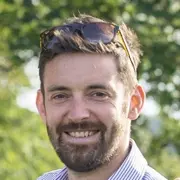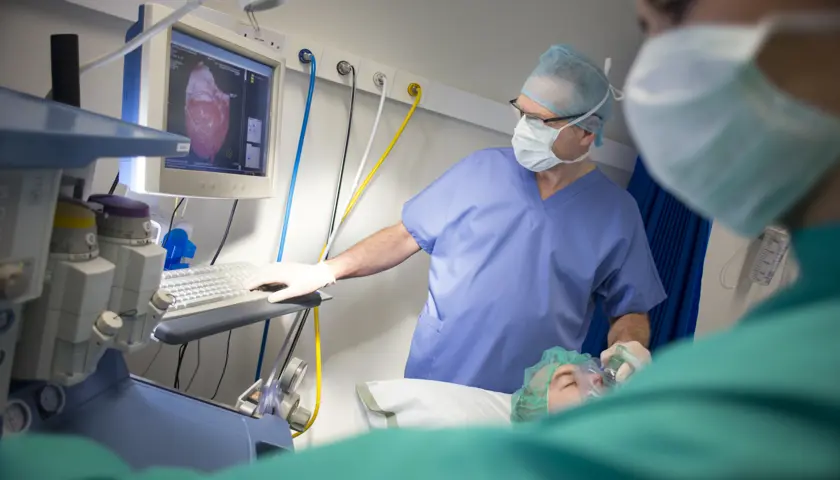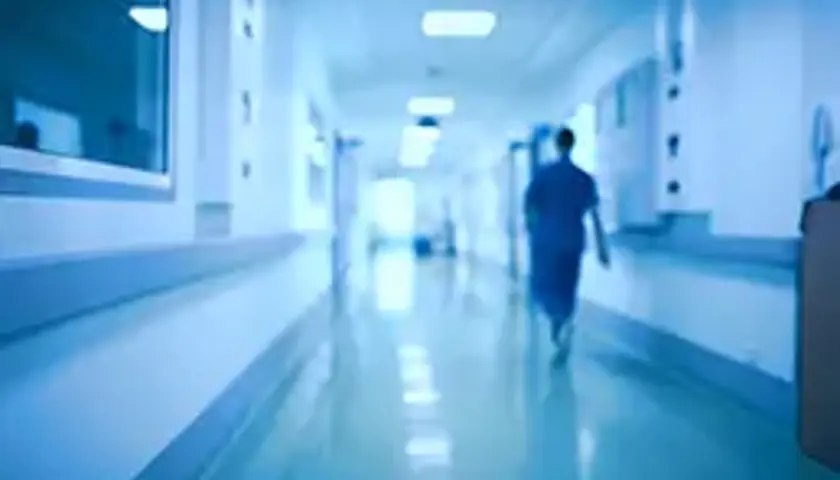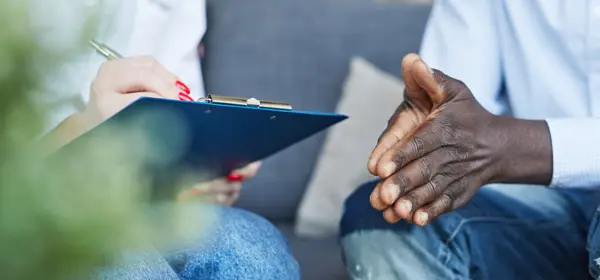
Pushed beyond the limit
Paul Miller was an 'excellent' doctor who died after pressures at work led him to feel 'trapped and overwhelmed'. Ben Ireland attended his inquest and heard from family members about an intelligent, kind and modest man
‘It’s so tragically obvious now that I should have just realised I was pushing myself too hard and reined everything in and taken control back then … I was struggling and could see no end to it. I felt trapped and overwhelmed by it all and was worried I would fail.’
The words of Paul Miller, a consultant haematologist who died in October 2022, in a note found by his side, show the effect his work had been having on his spiralling anxiety.
Dr Miller (pictured top) also wrote of how he felt ‘trapped in several Catch-22 life situations’, which contributed to admissions under the Mental Health Act – admissions which made him feel ‘shame’ and ‘guilt’, and that he could not return to work or move on with his life.
A recent inquest into Dr Miller’s death concluded that he died by misadventure.
Reading his conclusion, Westminster assistant coroner Bernard Richmond KC said: ‘Sadly for Paul, his mental health was such that he was prone to what I expect in reality were episodes of depression and that during those episodes of depression he would be personally highly critical of himself and he would also be quite destructive.’
Dr Miller’s family say there is no evidence that he was previously depressed and that a lack of certainty around his future employment after he became unwell through a stress-induced breakdown further contributed to his mental ill-health and episodes of self-harm.
His mother Monica described Dr Miller as a ‘gentle, kind and caring’ person. In a statement submitted to the inquest, she said: ‘I could never have imagined he could become so unwell and take his life in such a terrible downward spiral.’
'Rising star'
Paul Miller died on 12 October 2022, aged 44. He was employed by St George’s University Hospitals NHS Foundation Trust until January 2022, most recently as a locum consultant covering maternity leave. Before then he was a junior (now called resident) doctor at the trust. He also worked on separate research projects including one on the vaccination of stem-cell transplant recipients, which was published in the Journal of Infection after his death.
Dr Miller is survived by his young son, mother, brother and wife. Friends and colleagues remember him as an ‘incredibly bright’ person who ‘shrouded his intellect with a lovely modesty’, an ‘excellent doctor’ and ‘a rising star’ in research who was ‘warm, gentle, kind and considerate’. In his spare time, he was an avid climber.
The inquest heard how Dr Miller’s marriage had become ‘difficult’ when COVID started. His paternity leave for their new baby coincided with the first lockdown and applications for his first consultant role as he had recently acquired his certificate of completion of training in haematology.
His wife said he had been ‘quite keen not to go back to St George’s’ but was initially ‘happier’ when he returned from paternity in September 2020, as a locum consultant focusing on lymphoma.
She said in the following months he ‘started to show signs of extreme stress at work’ and had been ‘raising red flags’. When things ‘really escalated’, he was waking up in the night, worried about patients and sometimes being sick.
In July 2021, Dr Miller’s wife recalled he was ‘really worried’ about potentially being brought before an inquest into the death of a patient, triggering a bad experience he had as a junior (now resident) doctor.
‘The idea that you could be trying your best but something out of your control might go wrong and embroil you in a situation like this really worried me,’ Dr Miller wrote in his note, shared with The Doctor by his family.
Dr Miller’s mother told The Doctor that Paul had told her of difficulties at home. She said he also told her that COVID had been 'a huge factor', making his hospital work more difficult and affecting his research work, 'turning something manageable into a scheme he couldn’t cope with’.
That summer, he broke down and took time off work.
Dr Miller’s mother said his ‘anxiety increased’ when he stopped working: ‘When Paul had to take time off work because he had stopped sleeping altogether, the senior staff made no enquiries about his health,’ she said. ‘He just had an email a month or so later asking if he was doing the research work, which he wasn’t. He said he would have been ashamed of himself if he had treated a colleague the way the department treated him.’
Dr Miller's wife told the hearing he became ‘worried about his job prospects’ when advised to ask for more time to recover from the stress. This, she said, was because of a ‘culture’ at the hospital where ‘nobody takes time off sick’ and that ‘he wanted to be on his best behaviour to secure a full-time position when his locum post was up’.
Dr Miller wrote in his note he felt ‘manipulated’ by senior consultants to take a locum, rather than substantive, post, and that the atmosphere this created ‘started to cause me so much anxiety’.
He told the trust’s occupational health team he was suffering with work stress and began seeing NHS Practitioner Health.
GP Kate Little, who treated Dr Miller for NHS Practitioner Health from August 2021, said he presented with ‘mounting’ anxiety over several months and told her of panic attacks, insomnia and ‘low mood’. She told the inquest: ‘He had been under a lot of stress,’ referring to his work and personal life.
I was struggling and could see no end to it. I felt trapped and overwhelmed by it all and was worried I would fail
Paul Miller, in a note found at the time of his death
A phased return was planned for autumn 2021, with two sessions per week instead of five, split between clinics and wards – and no on-call shifts to start with.
Dr Little said this was agreed because Dr Miller had been keen to return but there were concerns. ‘I didn’t think he was ready to return to work,’ she said.
Consultant occupational health physician Samuel Thayalan, of St George’s occupational health team, told the inquest Dr Miller ‘was not ready for work… but he wanted to come back’, adding how he felt telling Dr Miller he was unfit to return may have made him feel ‘unsupported’.
‘All along he kept saying his plan was to get a substantive [consultant] post,’ Dr Thayalan told the hearing. He said Dr Miller wanted to return faster than he had been comfortable with.
In his first week back, Dr Miller reported that his clinic was ‘very stressful’. Notes made by the occupational health team, heard at the inquest, said he was advised to focus on his health and not return too soon.
When it was put to Dr Thayalan that telling Dr Miller he could return to work was ‘entirely unrealistic’, he said that is why he ensured Dr Miller continued to seek help through his therapist and NHS Practitioner Health.
‘Work [was] a very important part of his life,’ said Dr Thayalan. ‘I don’t think he would have given that up. I think work could have played a positive role, when he was ready.’
'Pressure to return'
The inquest heard how colleagues had made Dr Miller aware of permanent roles available at resident doctor or clinical fellow level, with no permanent consultant posts available. Dr Thayalan said this was ‘to help Paul, not to pressure him’.
His wife told the inquest he was ‘not ready’ to return but had ‘insisted’. ‘I got the impression he was feeling pressure to return to work earlier than he was ready for,’ she said.
Shortly after his return, she found him self-harming and called the crisis team. Dr Miller was then admitted under the Mental Health Act for the first time.
He ‘felt like he could never work again’ after he had been sectioned, his wife said, noting how he was ‘ruminating’ over the incident as their relationship deteriorated.
Dr Miller’s mother said he had told her his stress level had been ‘so extreme’ that he had a ‘fizzing sensation’ in his brain, and felt ‘part of it had been burned out’. She recalled him saying he ‘shouldn’t have been detained’, and ‘hadn’t wanted to kill himself, he had just felt so desperate and wanted someone to help him’.
Dr Miller had, with support from the BMA, been pushing for continuity of employment when his locum role came to an end.
His family told The Doctor they were concerned at the time that him being unemployed while unwell would make him ‘significantly more vulnerable’ and point to a ‘well-known link between unemployment and suicide’ noted in a Samaritans report.
They say he felt ‘pressured’ to take the locum role in the first place to ‘please senior management’ and that the confidence he told his mother he ‘needed’ to apply for consultant roles had been ‘knocked’ because he had been off work with stress.
After his locum post ended in early 2022, Dr Miller moved between London and his parents' home in Warwickshire.
Work could have played a positive role, when he was ready
Samuel Thayalan
In March 2022, he was sectioned again following an episode of self-harm, which involved being treated at St George’s emergency department before being transferred to a mental health facility in Kingston.
Dr Miller’s mother recalled him telling her he ‘won’t get better in there’, noting the ‘concrete little yard’ and that he was not allowed to take unaccompanied walks. She said he told her he was not happy with his medication and that: ‘He felt he was no longer the person he used to be and had liked, as a result of the effect the detention had had on him.’
The inquest heard how Dr Miller self-harmed again while detained. Consultant psychiatrist Afsaneh Tajer, who treated Dr Miller in Kingston, told the inquest it was the team’s conclusion that he had ‘no intention’ of taking his life. Pressed on this, she said: ‘Sometimes it’s a cry for help.’
Dr Tajer said it was decided not to extend his four-month detention despite this incident as Dr Miller may have seen that as ‘punishment’ and it would represent a ‘backwards step’ in his care.
Psychologist Rosa Chillari began treating Dr Miller privately in August 2022. She said he ‘wanted to find a way through’ but felt ‘stuck’ and ‘scared for the future’. Dr Chillari told the inquest she repeatedly asked Dr Miller if he had suicidal thoughts, which he denied.
Other clinicians who treated Paul reported how he ‘felt stupid’ because he had been admitted under the Mental Health Act, was ‘struggling with motivation’ and not sleeping. Notes show he told his GP he was trying to secure a substantive post, and this was playing on his mind.
In September 2022 Dr Little began speaking to Dr Miller again. Six days before his death, she recorded Dr Miller ‘seemed very fragile’ but continued to express an intention to return to work. She said this ‘felt very high risk’.
Notes from the London-based community mental health team show Dr Miller reported being ‘determined to get back to work’, at times feeling ‘quite optimistic’ and others ‘ruminating’ and displaying ‘risky behaviours’.
‘Stuck’
A transfer of care to Coventry and Warwickshire was eventually requested after concerns were raised about Dr Miller’s safety. His family say they had ‘explicitly’ and repeatedly asked for this because he planned to move to his parents’ house in Warwickshire but had at first been ‘ignored’, leaving details of his care plan unclear.
Alina Vaida, consultant psychologist at Coventry and Warwickshire Partnership NHS Trust, said Dr Miller had told her he would ‘rather die than be sectioned’ again.
She questioned his depression diagnosis and said he had explained feeling ‘stuck’ and wanted to return to work. He presented as ‘catastrophising’ but was planning for his future.
Dr Vaida told the hearing she was unaware how far out the appointment for Dr Miller’s transfer of care to Warwickshire, in February 2023, was set.
‘I would’ve insisted he was seen earlier,’ she told the coroner, adding: ‘If [that was] not possible I would’ve seen him myself.’
Dr Miller’s mother described how he was ‘positive for a few days’ after coming out of hospital, then fell back into a routine of ‘doing nothing’. Her diary, referenced in her statement, recalls Paul having difficult conversations with his wife and she said he also ‘missed his work’ and ‘knew he was a good doctor’.
His brother Matthew told the inquest that work stresses had been ‘an important factor’ in how Dr Miller had been feeling, along with how he viewed his relationship.
But he believes the inquest relied on a ‘simplistic narrative’ that if Dr Miller had sought help earlier, he might have survived. ‘Paul did seek help,’ he told The Doctor, backed up by months and months of notes heard in evidence at the inquest.
He said his brother had ‘significant additional pressures outside of work’, and that Dr Miller had been ‘expected to compartmentalise himself’ by dealing with his work and personal stresses separately. He said: ‘Employers should be receptive to supporting around wider issues – seeing doctors as whole people themselves.’
He told the hearing that ‘more nuance’ about whether Dr Miller should or shouldn’t have been sectioned, included in his medical notes, was not heard at the inquest. Their mother Monica added that Dr Miller ‘always talked about the shame’ of being sectioned.
The Doctor put a number of detailed questions to Dr Miller’s trust, St George’s, including how it would respond to the conclusion of misadventure. Other questions asked how the trust was tackling a culture of presenteeism, how it planned to support staff after colleagues had taken their own lives, and whether it believes in hindsight that the plan for Dr Miller’s phased return was correct.
Doctors across the NHS are facing increasing pressures and we encourage them to seek support
Richard Jennings
While the specific questions were not answered, Richard Jennings, group chief medical officer at St George's, Epsom and St Helier University Hospitals and Health Group, said: ‘We offer our deepest condolences to Dr Miller’s family and friends, as well as to our colleagues.
‘Doctors across the NHS are facing increasing pressures and we encourage them to seek support – we continue to promote supportive measures, including our dedicated staff support service, the Practitioner Health programme and BMA counselling service to ensure staff receive support for any issues, in or outside of work.’
In his conclusion, the coroner said of Dr Miller’s actions: ‘Despite everything that he felt, he knew that he had things to live for but that he used these episodes of self-harm or attempted playing out of self-harm to lance the boil of the frustration that he was feeling.’
‘Trapped’, ‘overwhelmed’ and under growing levels of anxiety from the pressures he felt at work and his home life, Dr Miller’s own words describe how feelings of ‘guilt’ and the stigma of being sectioned led to a ‘Catch-22 of life situations’ where ‘everything just spiralled’.
He asked his employer for help. His family would say it fell terribly and tragically short.
Seeking support
- If you have been affected by this article, or are feeling pressure and stress at work, you can find details of the BMA’s free and confidential wellbeing services here
- Details about NHS Practitioner Health service can be found here
- We have reported this inquest along Samaritans’ media guidelines for the reporting of self-harm, which recommends including no details of the methods used. You can find the guidelines here




